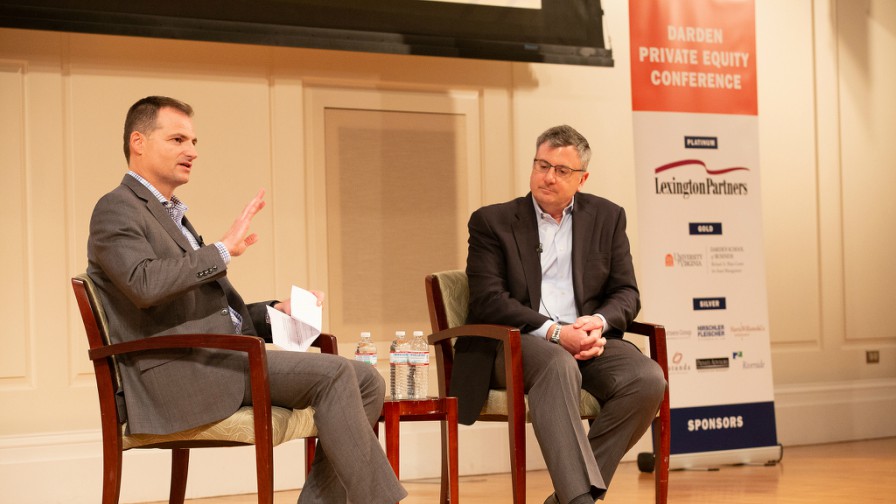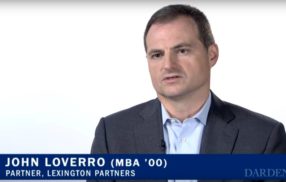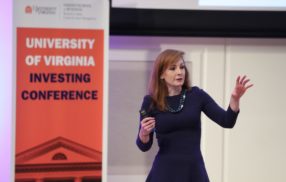
Private Equity ‘Flavors’ Expand, Industry Seeks to Solve Flaws Such as ‘Terrible Data’
By Dave Hendrick
The private equity industry represents a critical and growing part of the global economy, with trillions under management and no signs of a slowdown in fundraising.
For all its growth and financial innovation, however, it is also a relatively immature sector, often using comparatively primitive tools and methods, according to Erik Hirsch, vice chairman and head of strategic initiatives at the alternative investment management firm Hamilton Lane.
Keynoting the 2018 Darden Private Equity Conference at the University of Virginia Darden School of Business, Hirsch, a UVA alumnus, explored what he described as the evolution of the asset class from one in which there were “two flavors of ice cream — buyout or venture funds.”
“When clients talked about more risk, that was more venture, if they wanted more conservative, that was leveraged buyouts,” Hirsch said during a Q&A with John Loverro (MBA ’00) of Lexington Partners. “Today, there are lots and lots and lots of different flavors.”
With nearly limitless choices, Hirsch said firms such as Hamilton Lane are now hired less to be “pickers” and more as “constructors and allocators.”
Hirsch said investors are looking for “prudent asset allocation” and expecting data points on funds and fund managers beyond the oft-made claim of being “top quartile,” which he said was not based on an established benchmark.
“The asset class has a number of flaws and one of them is the data available is terrible,” Hirsch said. “All managers can claim their performance is excellent.”
Hirsch said he expected the industry would continue to mature and increasingly resemble “traditional businesses,” with all the infrastructure and investment that entailed.
“As the asset class evolves, it’s just more expensive to be a fund manager,” Hirsch said. “You can’t just be a firm that has six great deal people. You need a COO and an [investor relations] team and someone who understands technology. There’s a real squeeze and real pressure.”
Hirsch said the first phase of the “short history” of the private-equity industry began with ex-investment bankers whose differentiating skillset was an understanding of how to perform leveraged buyouts. The next phase began to incorporate limited operational capabilities, and the current phase for forward-thinking firms features a finer integration of finance and operations specialists, with employees coming from industry, consulting or other sectors offering “additive skillsets,” Hirsch said.
Too many private-market specialists still rely on Excel spreadsheets and calculators while their public-equity competitors invest heavily in cutting-edge technology, Hirsch said. The next model of private equity is “much more technologically driven,” with aggressive data mining and artificial intelligence playing a role in driving toward operational excellence.
As to why the industry lagged its peers in investment in various forms of corporate infrastructure, Hirsch said it was often simply a reluctance to part with capital.
“We’re cheap. LPs hate spending money and GPs hate spending it even more,” Hirsch said. “So when you go ask a GP, ‘Hey, what’s your R&D budget? What’s your tech budget?’ They look at you like you have three heads, because every dollar that they spend on that system is a dollar that’s not going home to them. It’s hard to see those businesses continue to be run that way.”
Watch: Hirsch on the Importance of Data in the Evolving Private Equity Landscape
The Operator’s Perspective
In addition to Hirsch, the conference featured a host of industry experts as panelists and speakers, including many Darden alumni engaged at all levels of the industry.
At a panel moderated by The Riverside Co. Managing Partner Peggy Roberts (MBA ’01) featuring multiple Darden alumni immersed in the operational end of the industry, operators discussed the broader corporate megatrends that are playing out in their companies.
John Young (MBA ’92), operating partner at Oaktree Capital Management, noted the great difficulty in finding skilled employees in the current labor market, which he said was pushing more companies toward automation.
Todd Riggs (MBA ’02), an operating partner at Tenex Capital Management, said he was also seeing increased use of machines, “particularly where you have repetitive motion jobs with zero intellectual content.”
Riggs said the automation in many industries had reached “a tipping point of affordability,” and said Tenex increasingly considered making early capital expenditures to increase automation in new portfolio companies “so you can get those projects going on Day one.”
Another trend potentially fanning the flames of automation and complicating personnel issues? Increasing health care costs.
Robert Northrop (MBA ’06), senior vice president of operations at turnaround specialist Resilience Capital Partners and current CEO of Affinity Apparel, said he was currently leading a company where health care costs were set to rise about 30 percent year-over-year, making the expense one of the company’s top costs. Northrop said the company was looking for solutions to minimize costs through tactics such as employee wellness programs.
“I never thought we would be doing that in an operations role, but it’s a real trend we are facing and will continue to do so in foreseeable future,” Northrop said.
Being able to wear the hats of both private equity partner and operator was a significant advantage, the panel agreed. Riggs said there was “no substitute” for being on the ground with a new portfolio company in the initial three to six months after completing a deal. Moreover, the Darden alums encouraged students to seek operational experience as a potential entry into a private equity career.
“Go run one of those businesses,” Northrop said. “You’ll learn more by doing that than looking at 500 deals. The largest driver of a PE firm being able to create value in a portfolio company is putting the right team in place and the right CEO.”
In addition to swapping stories of nightmare post-deal activities, the operators described the benefit of their Darden backgrounds. The team dynamics instilled in the Darden classroom paid dividends on a regular basis, the panel said.
Northrop lauded “the ability that people learn here to form a community and listen and respect other people’s points of view and incorporate that into their own thinking,” and he said solving sticky corporate problems often “doesn’t feel a lot different than when you are sitting around a learning team table trying to get through a case.”
Watch: The Importance of Impact Investing in Private Equity
Watch: Finding Opportunities in a Crowded Private Equity Environment
The University of Virginia Darden School of Business prepares responsible global leaders through unparalleled transformational learning experiences. Darden’s graduate degree programs (MBA, MSBA and Ph.D.) and Executive Education & Lifelong Learning programs offered by the Darden School Foundation set the stage for a lifetime of career advancement and impact. Darden’s top-ranked faculty, renowned for teaching excellence, inspires and shapes modern business leadership worldwide through research, thought leadership and business publishing. Darden has Grounds in Charlottesville, Virginia, and the Washington, D.C., area and a global community that includes 18,000 alumni in 90 countries. Darden was established in 1955 at the University of Virginia, a top public university founded by Thomas Jefferson in 1819 in Charlottesville, Virginia.
Press Contact
Molly Mitchell
Associate Director of Content Marketing and Social Media
Darden School of Business
University of Virginia
MitchellM@darden.virginia.edu









